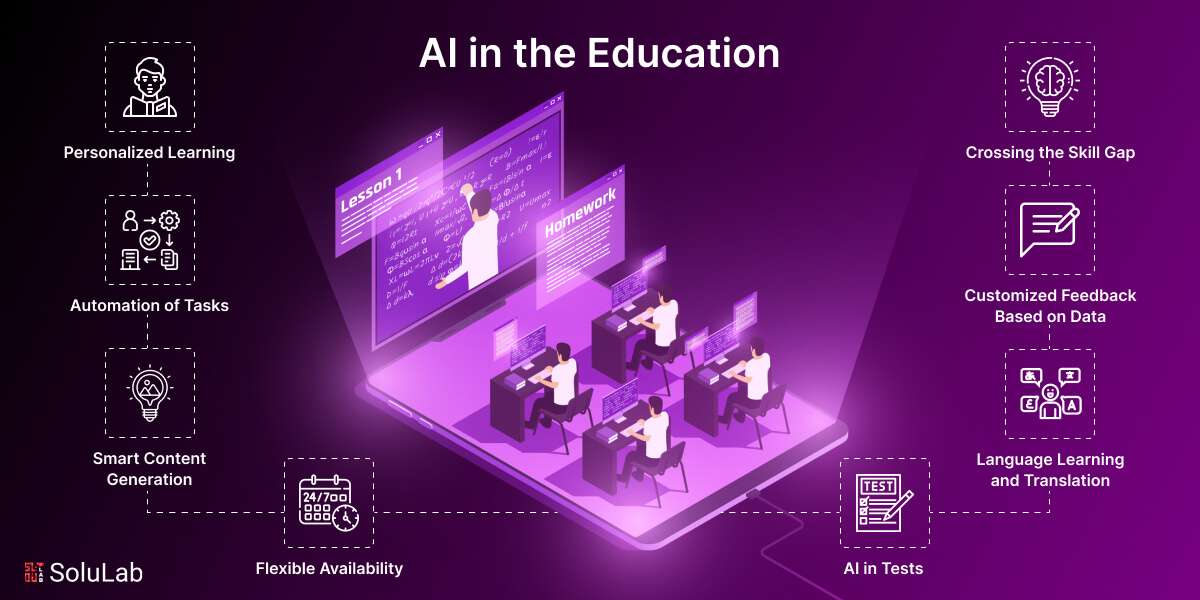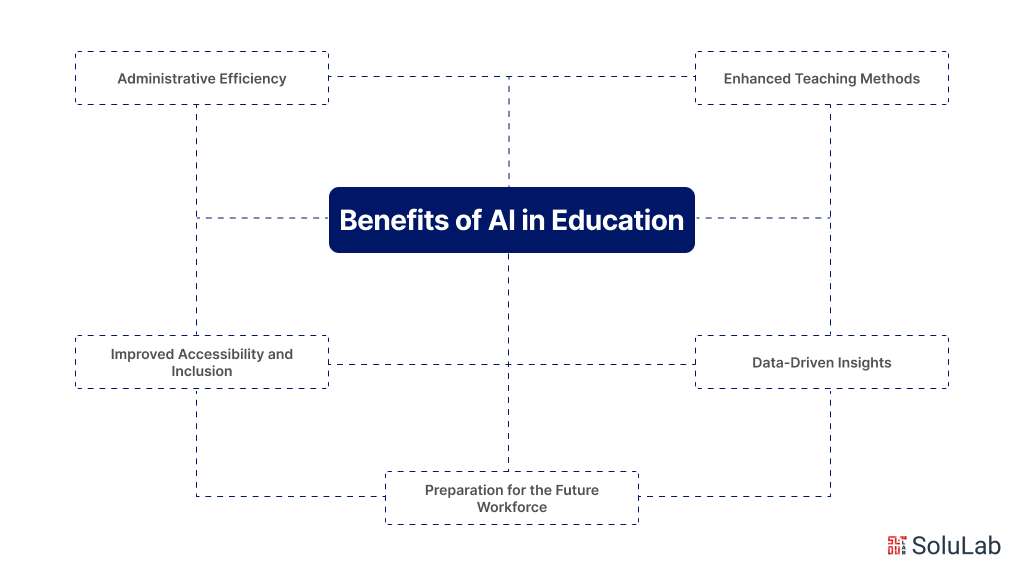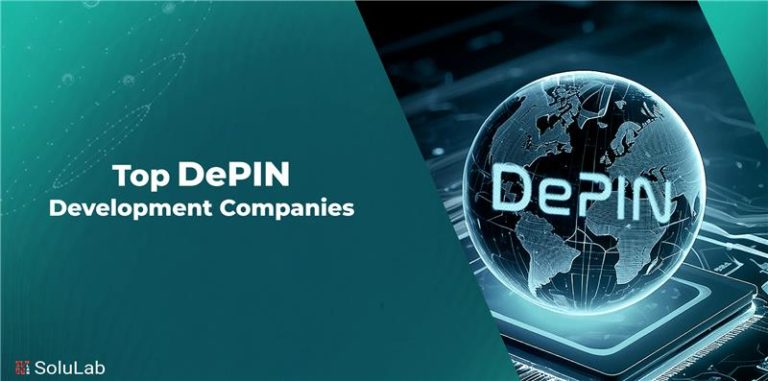
AI has become a fundamental part of our everyday lives, influencing every sector in ways that we never imagined possible. AI is changing the way we work and learn in fields as diverse as sports, construction, and education. AI in education has created new opportunities for students of all ages. Why is AI good for students? AI is providing innovative tools that cater to individual learning needs and enhance educational experiences.
Education firms now provide artificial intelligence courses and use eLearning tools to personalize learning experiences, uncover knowledge gaps, and provide focused feedback. Reasons why AI should be used in schools include its ability to offer personalized learning and to identify areas where students need additional support. The integration of AI and education has introduced a completely new idea of learning into the industry sector.
Facts about AI in education highlight how AI-driven technologies revolutionized traditional learning methods, such as virtual classrooms, internet resources, and smartphone digital courses. Considering more educational technology companies adopting AI technology, mentioned below are some uses and advantages of AI app development in the education industry.
What Exactly is AI?
AI, or artificial intelligence, refers to the simulation of human intelligence processes by machines, particularly computer systems.
Facts about AI in education show that AI, often known as machine intelligence, refers to the simulation of human intellect in computer systems, programs, or machines. If you believe this is a completely strange notion, you may be astonished to hear that you already utilize AI in your daily life. As an example, both Apple’s Siri and Google’s Alexa employ artificial intelligence-powered voice recognition.
Understanding the Importance of Artificial Intelligence in Education Technology
AI-driven education is perturbing traditional teaching methods and altering the industry’s technological future. Artificial intelligence (AI) technologies for education employ complex algorithms to examine large data sets in order to provide personalized and flexible learning environments. Students benefit from individualized learning, instant feedback, as well as exposure to immersive technology such as augmented and virtual reality in education.
Chatbots and virtual instructors who use conversational AI in education offer quick assistance while promoting learning on one’s own. AI chatbots for education are transforming how students learn.
These chatbots use natural language processing and machine learning methods to give students quick and tailored help, responding to their questions and leading them through the learning process. Creating dynamic and compelling learning experiences helps students understand concepts and remember knowledge more effectively.
How can AI be helpful in school is evident as AI trends drive significant growth in educational technology by enhancing student engagement through personalized courses, interactive lectures, enhanced classrooms for skill development, and so on, which is why the AI education industry is expected to exceed $20 billion by 2027. By 2023, the worldwide e-learning industry is estimated to generate $166.60 billion in sales.
Keeping these technological benefits in mind, here are the ten ways AI is altering the education sector.
AI Use Cases in Education
AI in education simplifies numerous processes and makes the learning process more convenient. Let’s take a look at the top 10 AI use cases in education that demonstrate how technology is revolutionizing learning.
-
Personalized Learning
Not every student responds to learning in the same way. Some people understand concepts fast, while others require more time. The conventional learning approach lacked the notion of personalized learning for each individual learner. This is where artificial intelligence may help with online education.
AI in the education industry guarantees that instructional software is tailored to each individual. Furthermore, AI for educators uses supporting technologies such as machine learning in education, the system validates how the learner interprets various teachings and adjusts to that process to reduce the strain.
How can AI enhance learning is addressed through this combination of AI with education focuses on each individual’s needs via AI-embedded games, personalized programs, and other aspects that promote successful learning.
-
Automation of Tasks
Artificial intelligence (AI) improves efficiency in education by simplifying numerous processes in virtual and traditional classrooms. AI solutions cater to a range of administrative duties, from grading tests and checking homework to organizing research papers and creating presentations. By automating these processes, AI optimizes the learning environment, allowing educators to focus more on personalized teaching methods.
How can AI enhance learning is evident as Businesses increasingly recognize the importance of integrating AI into education to meet daily objectives. Through AI-driven automation, educational institutions benefit from increased productivity and a wealth of knowledge. By relieving educators of mundane tasks, artificial intelligence and education fosters a more dynamic and engaging learning environment.
Read Blog: AI Use Cases and Applications
-
Smart Content Generation
Educators and researchers may also generate creative content for easy preaching and learning with the use of AI and ML in education. Here are a few examples of AI-powered intelligent content creation:
Data Visualization
Artificial Intelligence (AI) smart content production increases the real-life experience of visualizing web-based learning settings, when traditional education approaches can only present lab tries as visual elements. With 2D and 3D representation, where kids might receive information differently, technology helps.
Digital Creation of Lessons
AI in education can facilitate bit-size learning by providing digital classes and study materials with reduced storage requirements. In this manner, the complete study material may be utilized by specialists and students without using much system space. You don’t need to worry about distant learning either because these resources are available on any device.
Frequent Changes to the Content
AI makes it simple for users to create and update content often, which helps to keep the teachings relevant over time. Users also benefit from alerts anytime new content is released, which aids in organizing their workload.
-
Flexible Availability
Users may now make use of AI’s benefits in education since they have total access to information. A recent survey found that over 60% of businesses in the education sector rely on AI/ML-driven education applications that are supported by modern tools and features. Features like multilingual support make it easy to translate material into several languages, which improves learning and teaching for native speakers.
How does AI help with education is also evident in its necessity for teaching people who are deaf or blind. Presentation Translator, an AI-driven translation tool, provides simulated lectures with real-time translations.
Read Also: AI and ML in Data Integration
-
Assessing the Vulnerabilities in the Classroom
Using remote learning to maintain a good environmental effect is one of the many educational benefits of AI technology. Nonetheless, a lot of experts think AI will eventually take the role of human interaction in education. While it might not be applicable to the education sector, this nevertheless holds true for other industries. AI and education combine to improve online learning as well as traditional classroom training.
Artificial intelligence only helps experts by customizing the educational experience for every student.
-
Crossing the Skill Gap
Expanding students’ skill sets is a crucial strategy for businesses looking to bridge the technological gap. Software and application development solutions driven by AI and ML provide broadly accessible and reasonably priced upskilling options for students.
This is additionally beneficial for students: improving the skills of the present workforce in the corporate world might boost morale and encourage a commitment to innovation and advancement throughout the whole organization.
Furthermore, by examining how individuals learn new skills, the application of AI in the education industry has an influence on the L&D (Learning and Development) field. The technology automatically adjusts the learning process to individual study and learning styles as soon as it detects them.
-
Customized Feedback Based on Data
When it comes to creating learning experiences, either in the classroom or the workplace, feedback is an essential component. Effective teaching includes ongoing feedback, which is the primary distinction between it and material delivery alone. Since it is crucial that feedback originates from a reliable source, how does AI help with education evaluate and assign grades based on routine data?
A data-driven evaluation system improves student satisfaction, lessens learning bias, and facilitates the identification of situations in which a student’s skills are lacking. This feedback is customized based on each employee’s and student’s performance as documented in the system.
-
24 x 7 Support for Conversational Artificial Intelligence
Chatbots are one growing instance of AI in education to collect data and provide pertinent information and help. Whenever it comes to student engagement in tailored learning, this benefits both educators and corporate leaders.
By closely monitoring the pattern of information consumption and adapting to meet the demands of the learner, conversational artificial intelligence in education provides intelligent tutoring. Globally, people choose corporate training programs and distance learning since they don’t need to take time off from their jobs, families, or studies. Here, AI chatbots might respond to inquiries about registration, provide timely help, provide users with access to required study materials, and provide support at all times.
-
Language Learning and Translation
Artificial intelligence (AI) is revolutionizing language learning and translation, offering educators powerful tools to enhance their teaching methods. These innovative AI-powered platforms leverage natural language processing and machine learning algorithms to facilitate language acquisition in classrooms. Through dynamic and interactive lessons, educators can engage students effectively, providing personalized instruction tailored to individual learning styles and proficiency levels.
Moreover, what is AI in schools offers essential features such as pronunciation feedback and language translation tools, empowering educators to support their students’ language learning journey comprehensively. With real-time feedback on pronunciation and grammar, educators can address specific language challenges and boost student confidence. Additionally, language translation tools facilitate communication across linguistic barriers, enriching classroom interactions and fostering a more inclusive learning environment. In essence, AI-enhanced language learning platforms equip educators with invaluable resources to optimize language instruction and prepare students for success in an increasingly interconnected world.
-
AI in Tests
Software that uses artificial intelligence (AI) may be employed to spot questionable behavior during interviews and tests and alert the supervisor. Through the use of webcams, mics, and web browsers, machine learning algorithms keep an eye on every individual and scrutinize their keystrokes, notifying the system of any movements.
Contrary to popular belief, there are a number of benefits to employing AI-based software and services. This clarifies the reason why enterprises and EdTech companies are drawn to AI technology solutions that efficiently handle the wide range of customer pain concerns. Consequently, if you work in the educational sector, this is the right time to include AI technology in your teaching.
Benefits of AI in Education

Artificial Intelligence (AI) is revolutionizing the education sector, offering numerous benefits to students, educators, and educational institutions alike. Here are some key benefits of AI in education:
1. Enhanced Teaching Methods: AI-powered tools, such as intelligent tutoring systems and virtual assistants, provide educators with valuable support in delivering high-quality instruction. These tools offer real-time feedback, explanations, and guidance to students, allowing educators to focus more on personalized teaching methods and student interaction.
2. Administrative Efficiency: AI automates various administrative tasks, such as grading assignments, organizing course materials, and scheduling classes. By handling routine tasks, AI frees up educators’ time, enabling them to devote more energy to teaching and mentoring students.
3. Improved Accessibility and Inclusion: AI technologies can improve accessibility and inclusion for students with disabilities by providing assistive tools such as speech recognition and text-to-speech conversion. These tools empower students with diverse needs to access educational materials and participate fully in the learning process.
Check Blog Also: Top Artificial Intelligence (AI) Trends for 2024
4. Data-Driven Insights: AI analytics tools can analyze vast amounts of educational data, including student performance, attendance records, and learning patterns. By providing valuable insights into student progress and behavior, AI enables educators to make informed decisions and tailor instruction to individual student needs.
5. Preparation for the Future Workforce: By integrating AI into education, students gain exposure to emerging technologies and develop essential digital literacy and problem-solving skills. This prepares them for the demands of the future workforce, where AI and automation are expected to play increasingly prominent roles across various industries.
Real-World AI in Education Use Cases
With customized learning experiences catered to each student’s unique needs and talents, artificial intelligence (AI) applications in education are revolutionizing the way students learn. The following provides a more detailed description of how some leading international businesses and IT consulting organizations are fusing education with AI to produce innovative and user-friendly AI-based EdTech applications:
-
Google
One well-known technology that uses AI to streamline several aspects of education is Google Classroom. It enables educators to plan and offer assignments, provide feedback, and manage classroom behavior with effectiveness. The artificial intelligence (AI) algorithms in Google Classroom can facilitate automatic grading, offer personalized learning material suggestions, and analyze student data to offer insights on progress and performance.
Why should AI be allowed in school? Google Scholar and Translate are two extremely useful resources that improve teaching and learning for both educators and students. Language boundaries are no longer an issue thanks to Google Translate, which offers spoken language translations as well as rapid text and website translations.
In the meantime, Google Scholar makes it simpler for students, researchers, and educators to locate reliable and pertinent materials for their studies by using AI algorithms to evaluate and index academic resources, research papers, and scholarly publications.
Read Blog Post: Top 10 Artificial Intelligence (AI) Applications in 2024
-
Duolingo
AI is used by the well-known language learning software Duolingo to create adaptable language lessons. Artificial intelligence (AI) systems track students’ progress, identify areas for improvement, and adjust the course material as needed.
To help language learners improve their skills, the app provides personalized lessons, vocabulary exercises, and interactive assessments. AI also helps with recognizing speech, pronunciation feedback, and the production of engaging content, all of which promote effective language acquisition.
-
Coursera
AI is being used by Coursera to transform online learning. Students may get immediate feedback and customized ideas through automated exams, adaptive learning paths, and personalized course recommendations.
To recommend pertinent courses, dynamically modify course content according to learners’ progress, and offer immediate grading and feedback, the AI algorithms examine user preferences and performance data. The learning process is improved by these AI-powered features, which eventually raise student engagement and improve online learning results.
How Will AI Affect Education in the Future?
Artificial intelligence importance in education is here to stay. It’s best to embrace it as soon as possible because its influence in classrooms and educational institutions will only grow.
Although the precise nature of artificial intelligence’s growth in education remains uncertain, some inferences may be drawn from its current applications. As AI technology advances, it will be refined and made more precise in its current applications.
To enhance the effectiveness of data analysis and provide students with an even more customized experience, the way AI apps are used for learning, for instance, will grow more intricate and advanced.
In addition to AI programs, virtual reality software and games are probably going to be increasingly common in schools. Students may have first-hand experience with virtual reality AI, which simplifies and enhances learning. These technologies enable the performance of science experiments, providing a safer and more stimulating setting for pupils.
Artificial Intelligence’s importance in education will be utilized in schools to develop smart classrooms and smart buildings. We currently have technology that allows AI-powered apps to manage devices remotely, including lighting, alarms, and temperature.
By utilizing this technology, educational institutions may become more administrative and student-friendly as well as safer places to be.
Concluding Remarks
There’s no need to be concerned about AI being used in education. It’s actually a good thing. Artificial Intelligence is an innovative technology that may be utilized by educators and learners alike to facilitate and enhance the learning process. With the help of modern technology, students may now take control of their education and receive more individualized instruction whenever they choose.
SoluLab, a leading AI development company, provides customized solutions to transform education through AI integration. SoluLab’s expertise in AI technologies, such as natural language processing and machine learning algorithms, enables educational institutions to improve learning experiences and streamline administrative procedures. Whether it’s establishing tailored learning routes, creating intelligent tutoring systems, or automating grading and feedback processes, our skilled AI developers are dedicated to offering creative solutions that promote educational excellence. Contact us today to hire AI developers and achieve AI’s transformational potential in education.
FAQs
1. How does AI enhance personalized learning experiences for students?
AI creates individualized learning routes by using algorithms to examine each user’s interests in learning, styles, and academic data. Through adaptive content and tailored instruction, AI ensures that each student receives a customized educational experience, leading to improved comprehension and retention.
2. Can AI-powered tutoring systems effectively support students’ academic progress?
Yes, AI-powered tutoring systems offer personalized assistance by providing real-time feedback, explanations, and guidance to students. These systems adapt to students’ responses and progress, offering targeted support in areas of difficulty while challenging them in areas of strength, thereby facilitating academic progress.
3. In what ways does artificial intelligence assist in the administration of education?
AI automates various administrative tasks, such as grading tests, checking homework, organizing research papers, and creating presentations, thereby streamlining operations and saving educators valuable time. By handling routine tasks, AI allows educators to focus more on personalized teaching methods and student engagement.
4. What impact does AI have on language learning and translation?
AI-powered language learning platforms utilize natural language processing and machine learning algorithms to facilitate language acquisition. These platforms offer interactive lessons, pronunciation feedback, and language translation tools, enabling students to learn new languages more effectively and communicate across linguistic barriers.
5. How can SoluLab assist in implementing AI solutions for the education industry?
SoluLab, as an experienced AI consulting company, offers tailored solutions to transform education through AI integration. With expertise in AI technologies such as natural language processing and machine learning, SoluLab empowers educational institutions to enhance learning experiences and optimize administrative processes. Contact us today to hire AI developers and unlock the transformative potential of AI in education.






